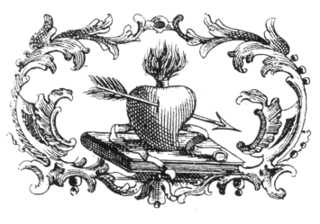Henry of Friemar may refer to:
- Henry of Friemar the Elder (c. 1245 – 1340), Augustinian theologian
- Henry of Friemar the Younger (c. 1285 – 1354), Augustinian theologian
Henry of Friemar may refer to:
Vincent of Lérins was a Gallic monk and author of early Christian writings. One example was the Commonitorium, c. 434, which offers guidance in the orthodox teaching of Christianity. Suspected of semi-Pelagianism, he opposed the Augustinian model of grace and was probably the recipient of Prosper of Aquitaine's Responsiones ad Capitula Objectionum Vincentianarum. His feast day is celebrated on 24 May.
Mill may refer to:
Agricola, the Latin word for farmer, may also refer to:

John Capgrave was an English historian, hagiographer and scholastic theologian, remembered chiefly for Nova Legenda Angliae. This was the first comprehensive collection of lives of the English saints.

The Order of Saint Augustine, abbreviated OSA, is a religious mendicant order of the Catholic Church. It was founded in 1244 by bringing together several eremitical groups in the Tuscany region who were following the Rule of Saint Augustine, written by Saint Augustine of Hippo in the fifth century.

James of Viterbo, born Giacomo Capocci, was an Italian Roman Catholic Augustinian friar and Scholastic theologian, who later became Archbishop of Naples.
Henry of Friemar the Younger was a German Augustinian theologian. He should be distinguished from Henry of Friemar the Elder.
William or Bill Perkins may refer to:
John of Basel or John of Basle may refer to:
Giovanni Lorenzo can refer to:
Michael Hurley may refer to:

The Augustinian theodicy, named for the 4th- and 5th-century theologian and philosopher Augustine of Hippo, is a type of Christian theodicy that developed in response to the evidential problem of evil. As such, it attempts to explain the probability of an omnipotent (all-powerful) and omnibenevolent (all-loving) God amid evidence of evil in the world. A number of variations of this kind of theodicy have been proposed throughout history; their similarities were first described by the 20th-century philosopher John Hick, who classified them as "Augustinian". They typically assert that God is perfectly (ideally) good, that he created the world out of nothing, and that evil is the result of humanity's original sin. The entry of evil into the world is generally explained as consequence of original sin and its continued presence due to humans' misuse of free will and concupiscence. God's goodness and benevolence, according to the Augustinian theodicy, remain perfect and without responsibility for evil or suffering.
Bergamo is a city in Northern Italy.
Prosper is both a given male name and a surname. Notable people with the name include:
Henricus is a given name. People with the name include:
Events from the year 1599 in France

St. Augustine's Monastery in Erfurt, central Germany, is a former church and monastery complex dating from the 13th century. The site is almost one hectare in size. It was built by Augustinian friars, an order of the Catholic Church. It is most well known as the former home of Martin Luther (1483–1546), the father of the Reformation, who lived there as a friar from 1505 until 1511.
Augustine's Influence on John Calvin describes how Augustinianism shaped Calvinism, particularly in its soteriological aspects and understanding of divine providence. Both Reformed theologians and John Calvin himself acknowledged the profound impact of Augustine of Hippo, the fourth-century church father, on Calvin's theology. Augustine's debates with the Pelagians provided the occasion for him to develop his own soteriology, which was notably influenced by his pre-conversion adherence to Stoic and Manichean teachings.
Jordan of Quedlinburg was an Augustinian hermit, influential writer and preacher. He is known for his advocacy of a moderate asceticism.
Henry of Friemar the Elder, known as Henry the German, was an Augustinian theologian, preacher and mystic.